Dave Appleby takes us through the basic requirements of setting up a call centre, from process blueprints to scheduling and forecasting.
Ok, so the time has come and business is good. Your existing team is doing OK but a few customers are getting missed. Callers are abandoning, customers are beginning to mutter. Staff are getting flustered. Dave Appeby asks – is it time to set up a call centre?
What’s actually changed? The product is still good. Sales are still high, but people are beginning to ask if your customer service is all it could be (or has been).
At the risk of getting into a grandmother and eggs situation, now is the time to look at how the existing operation works. It’s a what, why, where and when issue.
- What are the existing procedures?
- Why are we losing calls?
- Where in the process are we losing calls?
- When is the problem occurring?
Calls come in, people rush to answer, more calls come in, everyone’s exhausted, and by the end of the day, no one can remember why the rush happened.
Customers were queuing, angry at the wait. Staff are shattered and know that tomorrow’s going to be the same. Staff absence and attrition rise. Things start to slide and before long it’s become the norm not the exception.
At this point (or preferably before): Stop, Think, Act.
Call Centre Set-up Requirements – Where to Start
Start with the calls coming in and track their progress through your system.
Points to work on.
i) When are calls arriving? It may seem like a simple question, but are you getting peaks and troughs? Is an initial surge causing a knock-on effect through the rest of the day?
ii) How does the existing process work? By empowering the advisors with the ability to do ONE thing is there a way to reduce call length or reduce the number of repeat calls/callbacks required?
iii) Does the process ‘bog down’ at any point? Is something acting as a speed ramp?
iv) What are the main causes of abandonment? Long wait, complicated call type, or is there some other reason?
v) How is existing technology being used?
I don’t intend to go into the full process here as there are plenty of resources on the market and internet that provide guidelines for how to do it. I will, however, make one proviso.
Let your existing staff know what’s happening and that it’s being done for their benefit.
I know from experience that the first thing that goes through an advisor’s head is “What am I doing wrong?” They know that there are problems from the nature of the work discussed above, and the presence of what can look like a witch-hunting team can drop morale even more.
The second thing to go through an advisor’s mind will be “My job’s on the line.” Closely followed by “They’re going to make us work harder.”
Let advisors know that it’s for their benefit, solicit their feedback and, above all else, be as minimally intrusive as possible.
Just to keep you on your toes. Looking at the points above and taking them in a totally different order from the way they are presented.
Does the Process ‘Bog Down’ at any Point?
This is fairly simple to understand. Is there a reason a customer ALWAYS has to be transferred to another advisor/department or be called back? Is there one change you can make that will simplify the process?
When Are Calls Arriving?
Understanding your call-flow is the most fundamental piece of information you can have. While there are plenty of call-flow and workforce management software packages available, these are probably not required in the first instance.
As part of the process, call-flow should be mapped and compared to existing staffing levels at any given time of the day.
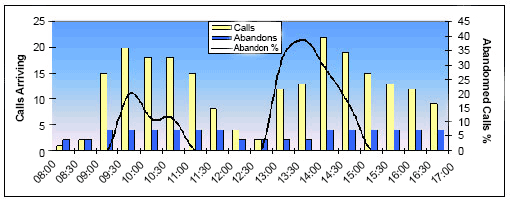
The graph below indicates call abandonment based on an advisor being able to handle four calls in a half-hour period.
It takes lunch breaks into account but not any other breaks, and assumes calls arrive at a constant rate. Whilst we know this is not true, for the purposes of illustration, it’s a good enough model.
The graph below indicates what happens when you move the staffing levels by 1 in peaks and troughs.
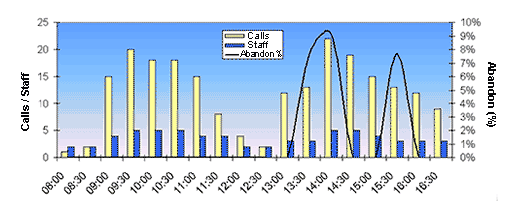
By making a minor adjustment to scheduling or calling an extra person onto the phones, the abandoned call rate has dropped from 26 to 4. This is at the cost of moving one and a half man hours from the back of the day to the front and 2 extra fill-in periods equalling 2 man hours.
As I’ve said, it’s a generalisation with even distribution so not quite ‘real word’, but good enough for demonstration.
The two graphs were produced using the data table below.
| Time |
08:00
|
08:30
|
09:00
|
09:30
|
10:00
|
10:30
|
11:00
|
11:30
|
12:00
|
12:30
|
13:00
|
13:30
|
14:00
|
14:30
|
15:00
|
15:30
|
16:00
|
16:30
|
| Call Arrival |
1 |
2 |
15 |
20 |
18 |
18 |
15 |
8 |
4 |
2 |
12 |
13 |
22 |
19 |
15 |
13 |
12 |
9 |
| Staff Example 1 |
2 |
2 |
4 |
4 |
4 |
4 |
4 |
4 |
2 |
2 |
2 |
2 |
4 |
4 |
4 |
4 |
4 |
4 |
| Staff Example 2 |
2 |
2 |
4 |
5 |
5 |
5 |
4 |
4 |
2 |
2 |
3 |
3 |
5 |
5 |
4 |
3 |
3 |
3 |
| Staff Difference |
0 |
0 |
0 |
1 |
1 |
1 |
0 |
0 |
0 |
0 |
1 |
1 |
1 |
1 |
0 |
-1 |
-1 |
-1 |
| Abandon Rate Example 1 (%) |
0 |
0 |
0 |
20 |
11 |
11 |
0 |
0 |
0 |
0 |
33 |
38 |
27 |
16 |
0 |
0 |
0 |
0 |
| Abandon Rate Example 2 (%) |
0 |
0 |
0 |
0 |
0 |
0 |
0 |
0 |
0 |
0 |
0 |
8 |
9 |
0 |
0 |
8 |
0 |
0 |
| Abandon Calls Example 1 |
0 |
0 |
0 |
4 |
2 |
2 |
0 |
0 |
0 |
0 |
4 |
5 |
6 |
3 |
0 |
0 |
0 |
0 |
| Abandon Calls Example 2 |
0 |
0 |
0 |
0 |
0 |
0 |
0 |
0 |
0 |
0 |
0 |
1 |
2 |
0 |
0 |
1 |
0 |
0 |
| Agent Call per Hour 2 |
4 |
4 |
4 |
4 |
4 |
4 |
4 |
4 |
4 |
4 |
4 |
4 |
4 |
4 |
4 |
4 |
4 |
4 |
As I’ve said, a simple change, a massive result.
How Is Existing Technology Being Used?
One of the biggest developments in technology in the last 30 years was the widespread introduction of the ACD telephone switch.
From the first ‘call centres’ in the early 70s, mainly amongst the American airline industry (which is why we still have ‘advisors’ on the phone today), the idea of a central contact point has expanded until it has become the normal method for a large company to service its customer base.
In fact, it’s worth noting that some large companies have gone back to the local contact point method (eg: banks) and are using it as a selling point.
From the first simple routing to the new hi-tech IP switches, technology in the contact centre has expanded and advanced at an almost exponential rate in the last 10 years. VOIP, CTI, Natural Voice Recognition and Universal Queues have all become buzzwords of the industry.
But, I hear you cry, what has this to do with me?
Absolutely nothing! is probably the easiest answer. An audit of existing technology may open some avenues that have previously been ignored.
Questions to ask yourselves are:
i) Do we just answer the phone or do we manipulate the incoming call at all?
ii) Do we get any reports from the switch or is it just shoving calls through?
iii) Do we have a team design or is it just a melee on the phones?
iv) Do we manage our phone activity? Are there set times for people to be on the phone?
At this point the audit is nearly finished. All that remains is to go back to the phone team and get each of them in turn to tell you where they think the problem is and suggest one solution.
You now have the basis to re-engineer the whole customer contact strategy.
Process Blueprint for a Contact Centre
Starting from the outside in. How does a customer contact you?
The process is probably something along the lines of:
Customer calls – This is purely the design of the existing telephone call. It does not reflect any background process issues affecting the customer.
Advisor handles call – With a simple process such as this, the call routing is easiest, and the customer has no idea of where they stand in relation to the rest of the calls arriving. Will they be answered in the next 10 seconds or is the wait going to be half an hour?
You all know as well as I do in this case the call is ALWAYS answered just as you decide to hang up and you hear the “Hello, thank you for calling…” just as you’ve gone past the point of no return in hanging up.

Although the system is simple, the scope for customer dissatisfaction is high. As with the staff rota example above, a few simple changes can lead to massive results in goodwill, customer and staff satisfaction.
Below are three examples of simple call routing changes (getting progressively more complex) that can be applied to most phone switches.
Example 1. (Simple ACD)
In this case at least the customer knows they are calling the correct company.
Once in the ACD, the customer’s call is then routed to the next available advisor, NOT the next person prepared to take a call.
The welcome message can also incorporate an out-of-hours message advising of opening hours or an emergency contact.
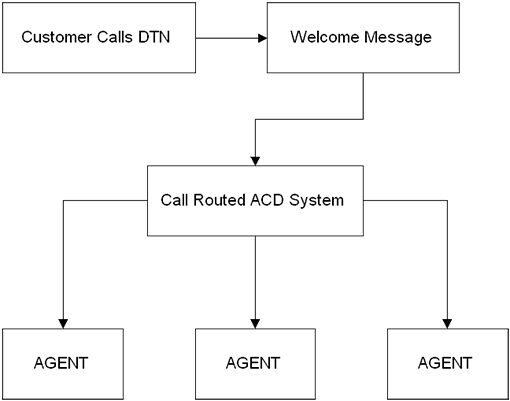
Example 2. (Skills-based routing)
By the addition of a single voice menu, calls are now routed by team. The customer has one choice to make and can almost immediately speak to the next available advisor in the section they require.
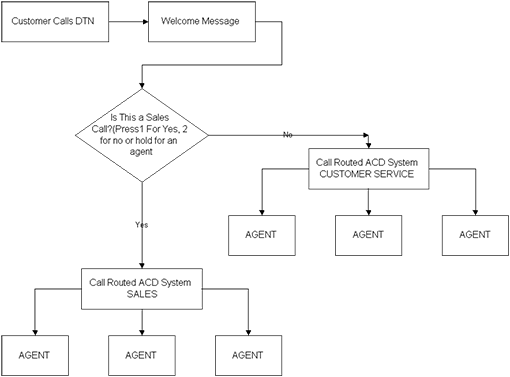
Example 3. (Hold system)
Note the area in the dashed line is a loop until an advisor is available. The timings are between messages and the advisor availability check is continuous. Music can be added between the hold messages.
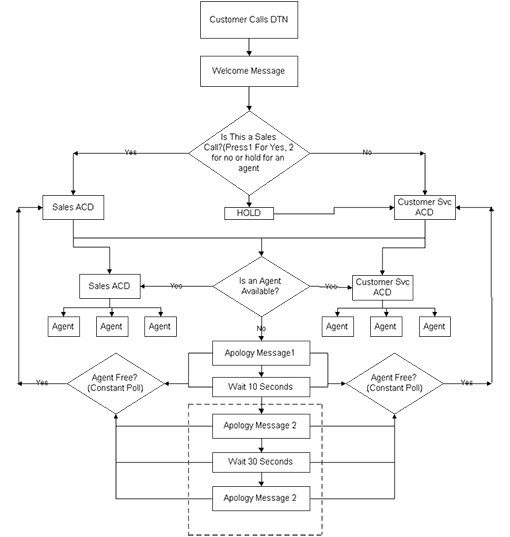
Below is a further refinement of the system giving the option for the customer to leave a message on an IVR (interactive voice response) system. This is the logical next step.
That being said, you need to refine the general business process to accommodate the call-backs generated by such a system.
The diagram below is the last of the general call-flow ones. These models use the assumption that all teams are separate. Other call-flow manipulation could include:
- If the customer service team is busy, wait 20 seconds then check if a sales team member is free, if so route the call (and vice versa).
- If you have a high demand on one team and low on the other, calls can route to the low-demand team as an overflow.
Both these options, however, mean that the teams have to be cross-trained on the other’s policies, procedures and scripting where required.
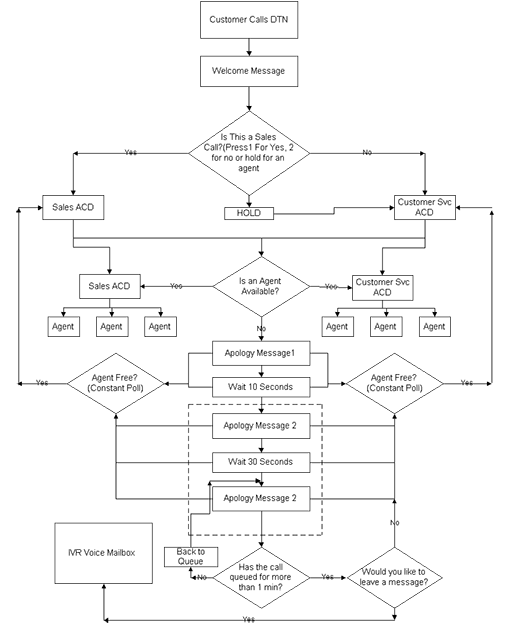
This is about as complex as most start-up call centres need to get, and the above facilities should be available either as part of the main package or as a bolt-on to any switch made after about 1985.
However, care needs to be taken in menu design. Nested menus, menus with four or more options, and overtly technical phrasing in the menu commands will ultimately drive abandon rates up.
Now the required set-up has been decided, it’s time to move onto the final section. This is where buy-in from the staff is at its most valuable.
As soon as you get to this point you can also capture messages out of hours.
Service Levels
The definition of service levels is a matter of great debate across the industry. Again argument rages about what measures to use, how many to use and how they are to be set.
In moving from an initial direct calls system to a distributed call basis, it is probably prudent in the first instance to define a couple of levels then play around until you have them working properly. Then as time progresses you can become more elegant both with the technological use of your switch and with the levels and measures you are using to chart progress.
So what service levels do we define?
Normally for a start your overall performance needs to be looked at; therefore a recommendation would be just three measures.
1. Average speed of answer
2. Abandonment rate
3. Service level
The first two are fairly obvious but the third is defined as: from the number of calls we answered how many fell within our target answer time?
As a starting place for defining your levels, benchmark indicators would be:
1. Target maximum answer time: 20 seconds
2. Target maximum abandon rate: 5%
3. Target service level: 80% (i.e. 80% of all answered calls to be answered in under 20sec – the conventional contact centre target service level)
In the beginning these should be looked at on a daily basis, then, as more information becomes available, start to capture your data in half-hour timeslots.
[For a more detailed run-down, read our article: How to Calculate Contact Centre Service Level]
Understanding Call Arrival
Implementing the technology changes and setting service levels will do much to alleviate the problems caused by chaotic call-flow. Staff-level planning to meet call-flow will (if implemented correctly) solve the rest.
From the base measures described, the next step is to capture the average handle time of each call.
This is not only the talk time (ACD time) but also the after-call tasks (wrap time) required to complete the work before the advisor is ready to take another call.
Forecast Models
Once you have the Average Handling Time (AHT) and your average call arrival you can start forecasting arrival.
Take the four weeks figures as below and a little manipulation will give you a basic forecast model.
This will be within 5-10% of what you can expect to happen, and will be adequate for a small enterprise.
Follow the link to find out: How to Calculate Forecast Accuracy
Call-Flow Arrival
Take, for example, the call-flow below, across a four-week period (fig. 1). Although the calls vary week on week, we can take an average and calculate the mean call arrival (fig. 2). We then round this UP to the nearest whole number (fig. 3).
Call-Flow Across a Four-Week Period
| Week 1 |
Mon |
Tue |
Wed |
Thu |
Fri |
Week 2 |
Mon |
Tue |
Wed |
Thu |
Fri |
| 08:00 |
5 |
6 |
5 |
6 |
7 |
08:00 |
1 |
6 |
7 |
6 |
6 |
| 08:30 |
6 |
7 |
5 |
3 |
6 |
08:30 |
2 |
3 |
4 |
4 |
5 |
| 09:00 |
7 |
7 |
7 |
9 |
10 |
09:00 |
6 |
5 |
5 |
4 |
4 |
| 09:30 |
10 |
9 |
8 |
10 |
12 |
09:30 |
12 |
14 |
14 |
16 |
11 |
| 10:00 |
15 |
8 |
14 |
20 |
21 |
10:00 |
13 |
15 |
15 |
16 |
20 |
| Week 3 |
Mon |
Tue |
Wed |
Thu |
Fri |
Week 4 |
Mon |
Tue |
Wed |
Thu |
Fri |
| 08:00 |
1 |
6 |
8 |
2 |
2 |
08:00 |
4 |
5 |
4 |
5 |
6 |
| 08:30 |
1 |
6 |
5 |
3 |
5 |
08:30 |
2 |
7 |
6 |
4 |
6 |
| 09:00 |
2 |
8 |
8 |
6 |
8 |
09:00 |
6 |
6 |
6 |
8 |
9 |
| 09:30 |
3 |
9 |
12 |
12 |
18 |
09:30 |
4 |
10 |
13 |
13 |
19 |
| 10:00 |
8 |
9 |
10 |
10 |
14 |
10:00 |
9 |
10 |
11 |
11 |
15 |
The Mean Call Arrival
| Average |
Mon |
Tue |
Wed |
Thu |
Fri |
| 08:00 |
2.75 |
5.75 |
6 |
4.75 |
5.25 |
| 08:30 |
2.75 |
5.75 |
5 |
3.5 |
5.5 |
| 09:00 |
5.25 |
6.5 |
6.5 |
6.75 |
7.75 |
| 09:30 |
7.25 |
10.5 |
11.75 |
12.75 |
15 |
| 10:00 |
11.25 |
10.5 |
12.5 |
14.25 |
17.5 |
To the Nearest Whole Number
| Average |
Mon |
Tue |
Wed |
Thu |
Fri |
| 08:00 |
3 |
6 |
6 |
5 |
6 |
| 08:30 |
3 |
6 |
5 |
4 |
6 |
| 09:00 |
6 |
7 |
7 |
7 |
8 |
| 09:30 |
8 |
11 |
12 |
13 |
15 |
| 10:00 |
12 |
11 |
13 |
15 |
18 |
Now, taking the AHT, we can calculate the number of advisors required.
In this case I’m using a nice simple 300 sec (5 min).
Advisors Required in ½ hr = ( AHT * Calls)/1800. This gives the figures below.
| CALLS |
AGENTS |
| Average |
Mon |
Tue |
Wed |
Thu |
Fri |
Average |
Mon |
Tue |
Wed |
Thu |
Fri |
| 08:00 |
3 |
6 |
6 |
5 |
6 |
08:00 |
1 |
1 |
1 |
1 |
1 |
| 08:30 |
3 |
6 |
5 |
4 |
6 |
08:30 |
1 |
1 |
1 |
1 |
1 |
| 09:00 |
6 |
7 |
7 |
7 |
8 |
09:00 |
1 |
2 |
2 |
2 |
2 |
| 09:30 |
8 |
11 |
12 |
13 |
15 |
09:30 |
2 |
2 |
2 |
3 |
3 |
| 10:00 |
12 |
11 |
13 |
15 |
18 |
10:00 |
2 |
2 |
3 |
3 |
3 |
Unfortunately, whilst they represent a theoretically perfect figure, the figures above cannot be used, as they assume a ‘perfect world’ where calls arrive one after the other and staff work every minute.
Without working your staff to death, you can apply an arbitrary figure for expected productivity (anywhere between 60 and 75%) and then apply this.
So our formula changes to:

Using a figure of 65% for productivity, this would give a staffing level of:
| CALLS |
AGENTS |
| Average |
Mon |
Tue |
Wed |
Thu |
Fri |
Average |
Mon |
Tue |
Wed |
Thu |
Fri |
| 08:00 |
3 |
6 |
6 |
5 |
6 |
08:00 |
2 |
2 |
2 |
2 |
2 |
| 08:30 |
3 |
6 |
5 |
4 |
6 |
08:30 |
2 |
2 |
2 |
2 |
2 |
| 09:00 |
6 |
7 |
7 |
7 |
8 |
09:00 |
2 |
4 |
4 |
4 |
4 |
| 09:30 |
8 |
11 |
12 |
13 |
15 |
09:30 |
4 |
4 |
4 |
5 |
5 |
| 10:00 |
12 |
11 |
13 |
15 |
18 |
10:00 |
4 |
4 |
5 |
5 |
5 |
To the Nearest Whole Number
It is now reasonable to staff to these levels and expect to hit your service targets.
For more on this subject, read our article: How to Work Out How Many Staff You Need in a Contact Centre
Tips and Tricks
Forecasting software normally employs a formula called Erlang-C to predict call-flow. Agner Erlang was a Danish mathematician who specialised in probability, and in 1908, whilst working for the Danish Telephone Company, he devised the Erlang-B and C formulas for predicting call arrival into switchboards.
He is thought of as the father of Queuing Theory.
Whilst much has changed, the formulas he discovered are still relevant today and are still (with a few minor changes) widely used.
Erlang calculations can increase the accuracy, but do you really want (in the first instance) to be using the formula below?

Didn’t think so!
[While this may look scary, you can always use an Erlang Calculator to help you with this].
Breaks
When assigning breaks, one basic factor of human nature comes into play.
People call in the first or third quarter of an hour and will normally call in the first 10 minutes. So when assigning breaks it is both sensible and prudent to go for either the second or fourth quarter.
Summing up
I hope this has given you a bit of an insight into how it is possible both practically and financially to improve your customer service side.
In fact, most of the points above require very little in the way of capital outlay.
As I’ve stressed above, though, the most important people in this equation are your customers and staff. All in all, can you afford not to make ‘one small change’?
Requirements Checklist
You will probably need to create a project plan and a checklist to set everything up. We have complied two very useful checklists to help you with this.
We also have an article on how to turn all of this into a business plan. You can check the article out below:
Originally published in May 2009. Recently updated.
Dave Appleby has been working as a planner, forecaster and analyst in the contact centre industry for the last 16 years, having been a chef in a previous life. Starting off working on the phones for the launch of a Grocery Home Shopping service, he has worked for a variety of in-house and outsource operations, including Disneyland Paris, Seeboard, GIftaid, GM Finance and the Daily Telegraph. A keen diver (both instructor and cave diver), Dave is currently a senior analyst for a large UK insurance company.
Author: Jo Robinson

81 Comments
-
All well and good as as this is a site called call centre helper excellent article. May I ask however what to do where the telephony side is only a small part of the customer service process and there may be admin tasks assiociated? how would you track,measure, monitor and schedule for non phone activities?
Nick
7 May at 08:03
-
That comes later!
This was really written for a small / medium business
that need to start looking at the process they use to manage their direct customer contacts.
It’s really of the nature of a primer or introduction
to telephony routing and to get people thinking about how
the do things now, and, where to go next.
Regards
Dave Appleby
7 May at 10:29
-
Fascinated by the comment re calls coming in in the first or third quarter of the hour. What is the reasoning behind this and what evidence is there for this?
Thanks
Scott
Scott Macfarlane
5 Jun at 22:52
-
I am doing research on call forecasting. Can you give some elaboration on this “People call in the first or third quarter of an hour”
Ross
1 Jul at 15:21
-
Scott / Ross,
I’m not sure there’s any research* available apart from..
1) Looking at what actually happens
and…
2) Asking people when they call, collegues are great for this. In the office look to when people are calling Utilities / Banks etc…
It’s something I was a sceptic about until I actually looked at it.
There’s something abouth the..
“I’ll leave it until just after 10…”
Regards
DaveA
* That said there’s probably a paper in it somewhere!
Dave
1 Jul at 20:06
-
My intuition is the same. There is a kind of natural “synchronization” of calls because people tend to work and do other things on exact hour (and sometime on half hour).
Ross
1 Jul at 20:41
-
Hello Mr. Appleby,
I am working hard to set up a contact centre in India. For that purpose I need some consultants or advisors who could help me get clients. I wonder If you could help me.
Thanks & Regards,
Vivek Dixit
Vivek
11 Jul at 07:25
-
Can anyone assist me, I im setting up activity codes (not ready codes) so that i can monitor what my staff do when not taking calls. Does anyone know if and where i can get regulations or guidance regarding this.
Thanks
Scott
5 Aug at 11:45
-
In response to the comment “what to do where the telephony side is only a small part of the customer service process and there may be admin tasks assiociated?” Some sytems enable an agent to be offline to complete tasks, they also have a drop down list to indicate which task is being performed, this along with pre-written Standard Operating Procedures will be able to track your complete workflow.
Craig
Craig Danks
6 Aug at 09:51
-
Hi there,
I’m part of a team of a few people looking to set up a helpline for disabled students at away from home at university. Finding information, volunteers and even funding is not so much the task for us, but knowing about the technology, providing companies etc. is a nightmare! Are there any tips you could give us, or any pointers to guides, or anyone who we could get in touch with to tell is where to start?
Thanks,
Megan
Megan Roberts-Lewis
7 Oct at 14:16
-
actually i want to open up a call centre at small scale so please give me the right direction what i hav to do and how should i start i am new in this field
aaditya
14 Oct at 12:03
-
hi
Im looking for a cost plan to set up a call centre upto 50seats.project report kinds.
Also if you can help for geting inbound business as well.
riya
27 Oct at 11:06
-
Hi,
I don’t understand the sentence : “…routed to the next available agent, NOT the next person prepared to take a call”
Thinh
10 Dec at 07:13
-
better way to simplify the massive things.
sadhu
4 Jan at 17:00
-
I use erlang C for half hourly modelling not an issue – how can i forecast weekly volumes without going down to half hour level? regards
Paul
Paul
14 Jan at 12:32
-
firstly i would like to commend you on such an insightful accomplishment.
i intend on starting up a call center in nigeria and was wondering if there are any pointers that you could recommend.
franklyn
23 Feb at 02:42
-
I can understand the concept on the resource planning formula; but how it relates to the SLT and ABN you mentioned? Kindly elaborate a bit more and thanks.
Connie
15 Mar at 04:31
-
i wnt to start my own call center but do not know from where to start from . please guide as soon as possible.
shree dhurat
3 Apr at 07:23
-
Hi there. I thing about starting a call centre for language minorities (people that live in UK but dont speak english) Is there any chance of success ? what are your views ? regards Rafal
Rafal
21 Apr at 22:02
-
i wnt to start my own call center but do not know from where to start from . please guide as soon as possible. for two person atleast as our company is currently outsourcing our call center however we find it very expensive & not productive.. Please help
alisha
5 May at 08:35
-
Well done and clean inforfmation. I would like to know more about call centre business and how to get clients/organisations. I would like to start this business in India. Thanks.
varghese
9 May at 09:53
-
I want to setup call centre for my travel industry. Do you have any knowledge on this business. What i want to do is to setup a call centre let assume in India and ask them to answer call if any and do a cold calling to generate some business.
Do you think u can help in any manners?
vijay shah
22 Jun at 22:58
-
a call center is just like a another home to the worker.
and we all know that the money talks. TO START A CALL CENTER, EVERYONE GOT 2 PROBLEM IN 1ST TIME.
1>MONEY PROBLEM.
2>FINDING A PROCESS.
If some one can handle that, he/she have there own call center business (in/out).
Raz
12 Jul at 21:49
-
I have full material of call center setup and also i have call center process and anybody require these these thing contact us. 09953160038
Atul pathak
17 Jul at 14:04
-
Dave,
I’m very interested in what you have posted. Do you have some sort of an eBook developed, and possibly take the time to chat about how one goes about setting up a good call center, primarily from a technological standpoint? Let me know! Thanks!
Andrew
21 Jul at 20:57
-
actually i want to open up a call centre at small scale so please give me the right direction what i have to do and how should i start i am very new in this field.
steve
18 Aug at 11:41
-
actually i want to open up a call centre at small scale so please give me the right direction what i have to do and how should i start i am very new in this field.
Ratnesh Rathod
23 Aug at 13:52
-
I am working on setting up a call centre for a Learning Management Solution, wherein the users are primarily teachers, students and parents.
What is your say on the number of users that can be supported (on voice OR mail) per customer agent?
Need it to analyze the feasibility.
Thanks
AHB
16 Sep at 11:26
-
Hi,
Please advice me that how I can start a call centre business in india.waiting for your advice.
With regards,
Ajay Chettri
ajay chettri
22 Sep at 19:23
-
Hi,
I want to open small size call centre. Kindly please suggest how to proceed same.
Regards
Robin
Robin
24 Sep at 07:57
-
Hi Dave ,
The matter that you have posted on this site is quite useful and comprehensive .
I request you provide me some ebooks regarding equipments and their set up for inbound and outbound process. i have worked in call centre ..interested to open a call centre in India …
Please help !
Regards ,
Ashok Kr.
2 Oct at 15:23
-
Dave
I am looking at moving an outsourced call centre to and inhouse call centre. I have never run a call call centre let alone set one up and could really do with some guidance thanks
tim
8 Oct at 08:46
-
I am planning to set up a medical call centre in Nigeria to promote or support clinical/telememedicine service
How do I get this done and what average cost I nust anticipate anbd what equipment/facilities do I need?
Abdulazeez Musa
31 Oct at 07:26
-
Please advice on how can I start a call centre business in India. Need to know the complete process involved in getting the business. Expecting a reply at the earliest. Regards
Anju
1 Nov at 19:48
-
i am interested to start call centre i have ten computers pls guid me the process in detail .
mohd Yaser
7 Nov at 14:02
-
nice one.But at times like our call centre( telecommunication industry)i believe all has been done to assist customers effeciently,BUT….
We still got problems
1-Agents can be too slow due to lack of product and computer applications (ours are CRM,CTI,IN,PRETUPS etc,) knowledge, that means not being properly traind or training being 2 fast for slow learners.
2-lack of COMMUNICATION by other departments..we shouldnt knw the latest promotion by our customer.that means call centre is part of marketing and marketing department should work hand in hand with call centre before visiting media houses.or else time is goin to be wasted in one…
tyrone
9 Nov at 16:31
-
I need to draw up plans and costs for a complete working call centre including all equipment, technologies and staff etc. can anyone assist me please.
Jack
13 Nov at 16:08
-
hello,
We have plans to start an 100 seater outbound call center in India.
Can you pls guide me with a project plan and complete costing/feasibility of the project including of infrastructure,operations,staff.
Regaards
Shubhi
26 Nov at 04:37
-
Our company is interested in setting up an FAO (Finance and Accounting Outsourcing). Currently we train and hire medical transcriptionists and provide call center training for near-hires. We are still a small group, with 40 seats available but we are planning on expanding to other products and services.
We hope you can give us more information about setting up an FAO. What are the requirements and procedures as well as and cost and pricing.
Thank you very much and we hope to hear a favorable response from you.
aileen dela cruz
16 Dec at 04:50
-
i want to start my call centre. but i have no money for investment.can u tell me without mony how can start my own call centre. i have good knowldge of indian buisiness.
ARVIND KUMAR JHA
8 Jan at 14:58
-
Can you pls guide me with a project plan and complete costing/feasibility of the project including of infrastructure,operations,staff.
santosh kr panday
11 Jan at 08:10
-
Hello Dave,
I am planning to start a call center by the end of the next year. I do have enquired about all the resources that I need to start with. But, the project is lacking the most vital ingredient, “A Process” on which we will work.
Can you please help me get some or may be you can show me the way how to approach further. Your help will be appreciated.
Thanks.
Ritu Raj Gogoi
25 Jan at 21:40
-
Can you pls guide me with a project plan and complete costing/feasibility of the project including of infrastructure,operations,staff..?
Cheers;)
Abi
2 Feb at 02:29
-
Wonderful piece of article.Thank you
Traffic
6 Feb at 22:08
-
i want to start a call centre how can i get my clients
jai parkash
5 Mar at 08:15
-
I have planning to set up my own call centre ,can you please help me out for this .
Nitin Manwar
28 Mar at 14:56
-
Hi dave
I’m trying to setup a very very basic call center to handle about 15 to 20 calls a day with two to three techs. Each call takes about 15 to 30 minutes to solve. We are just starting out so we Need help on how to start and what to get. Can you let me know if this is something at you’d be interesting in helping with.
We currently use one box but were quickly outgrowing it’s capacity as they limit us with minutes and no queuing
Jason Owen
CEO
Jason owen
2 Apr at 23:15
-
Hi Dave,
I am looking to set up a call center for a TV commercial and am totally new to the call center network and how to figure out how many people I would need to staff it. Can you guide me to someone knowledgeable in all aspects from start to finish?
Thanks, Steve
Steve
14 May at 22:44
-
i want to set up my own call centre ,but i dont know the process .please help me……
priyatesh anand
18 Jun at 10:34
-
Hi Dave,
Your article is very insightful and I have learnt alot.
Thanks
Peter
4 Aug at 11:56
-
How much does it cost at least to start a small call center with 5 agents?
Anonymous
15 Oct at 04:13
-
hello everyone,i want to start my own call center ,i am new in this field ,please explain me,what would be the cost,capital,
infrastructure etc.please call me someone to explain me.
mahadev
22 Oct at 10:04
-
hello there,
i am trying to have some ideas on how to organize a call center
Malika
17 Nov at 20:23
-
hi,
i want to start directory service center like just dial, can you please tell what infra and software are required and which infra and software will be best.
we want people to cal us for any business enquiry and we want the agent to give them info on phone as well as through sms.
thanking you
Basmon
26 Jan at 14:59
-
With the advancement in Information technology setting up a call center now a days in no big deal. Talking about the legal requirement you need to have the trade licence and DOT licence to begin with. Talking about the equipment and accessories you need to have a server, a dialer, headset, computers, Leads, Calling Minutes and of course the most important of all the PROCESS. Not to discourage you guys but let me also put this point forward that setting up a call center is easy but running the call center is not. It requires experience, skill and knowledge where mostly the new companies/call center struggle to sustain. We provide all round support regarding all these be it setting up a call center or arranging a campaign or running the operation to achieve the bottom line.
Dipankar
19 May at 19:57
-
Hi! i see you are very knowledgeable in this field I would like to set up a small call center, would it be possible to provide me with a insight of cost, infrastructure and how to achieve and source customers.
Thank you
Amanda
11 Jun at 20:11
-
Awesome information my friend…Thanks for this lovely article. Will help me a lot in many ways..Cheers!
Neha Salve
4 Jul at 19:48
-
Sir, I want to open a call center in small scale in telecommunication industry please give me knowladge about this field
Divya Darshan Pant
14 Jul at 11:00
-
I have no problem with location and capital to start a call center. I just need to know more about the technical details and the infrastructure. Dialing will be to and from UK and USA. What will be the best set-up to earn better profit.
Thanks!
rammel yoolac
4 Aug at 07:07
-
whats the best software to use in a virtual office contact centre.
Ados
9 Aug at 21:12
-
I would like to setup a basic call center. Please give me the basic technology hardware to purchase.
Thanks,
Morris
Morris
22 Aug at 14:14
-
i want to set up my own call centre ,but i dont know the process .please help me……
pankaj kumar mandal
23 Sep at 18:50
-
What wanna say a big “Thank You” to the creater and updater of this website. THANK YOU !!!
Nausheen
9 Nov at 09:35
-
Sir, I want to open a call center in small scale in telecommunication industry please give me knowladge about this field
shiv om
14 Feb at 16:03
-
hi
i want to open a call center and i dont have any idea about this and this is my first time i a playing to open a call center . pl advise me
Anonymous
21 Feb at 13:42
-
Hi!
Is it possible to convert my internet business into call center.
Fatti
28 Feb at 07:19
-
I want to setup call centre with voice recording. Will you please explain me how technically it should be equipped in terms of server, client (Will thin client work?), Telephony, Internet connection, firewall or any other equipments.
Mahen
Mahen
12 Mar at 12:44
-
Hi im thinking of setting a call centre for a letting agent. I would be grateful if you can give me further advice. I am looking to start by recruiting 10 to 15 people. I am looking to expand to up to 100 to 150 staff in the future
Diane
28 Mar at 23:14
-
real good article, keep up the good work.
Thanks
Benson
18 Aug at 13:35
-
Hey Dave. great to see that someone actually knows what he is talking about. We are tech company and thinking about openning a call center with prescreened and qualified technicians. Any recomendations how to promote and setup (with minimal financial damages) this business…you are the best person to ask in my opinion. Any help would be helpful. Thank you in advance
Cheers
Russ
25 Oct at 11:39
-
i want to set up my own call centre ,but i dont know the process .please help me……
Ashok Agarwal
18 Jan at 06:58
-
Hi there,
I have read your article on how to set up a call centre with great excitement, it could not have come up at a better time than now.
Briefly l want to set up a call centre in Harare, Zimbabwe. The reasons for setting up this call centre primarily in Harare are two-fold. There is a high level of literacy in Zimbabwe which is coupled with very fluent proper English speaking where the caller does not assume what the agent is trying to say. More often than not, people get very frustrated when the agent”s pronunciation of words are not very clear.
Thirdly, technology literacy in Zimbabwe, is the highest in Southern Africa and would eventually become a hub of outsource call centre not only for UK but for other English speaking countries in Southern Africa. Above all it creates a lot of employment for the current population where unemployment is currently standing at 80%.
Could l kindly ask for your guidance, project plan and complete costing/feasibility and the technology requirements for such a venture.
Once again thank you for such resourceful on Call centre
Kind regards
Alex
Alex
30 Apr at 23:46
-
Hi Alex
I’m afraid that we get some many requests that we are unable to offer individual guidance on setting up a contact centre.
jonty pearce
1 May at 10:20
-
Of most interest to me were the lack of certain insights (basically it was written from a managerial point of view, not therefore including some of the niceties of the torture involved for the average employee in the average call center–and I have almost never seen any exception to this in organization or active management) and the non (fill in the blank) of some of the commenters or questioners, term them what you will.
Glenn Charles
19 Oct at 23:42
-
I am interested in hearing what targets levels have been set for
% of calls answered within X seconds
average wait time
% of time agents should be on the phones compared to % on other activities in a contact centre
I am currently reviewing my targets and would be interested in understanding if mine are realistic
thanks
Sue Ellis
26 Feb at 17:01
-
Hi Dave,
I wanted to know regarding the infrastructure required to setup call center for a small business enterprise comprising of both inbound and outbound calling.
Lakhan
2 Mar at 09:37
-
How long does it take to set up 800 seat call center project ?
Max
9 Jun at 07:18
-
HELLO DAVE I JUST WANT TO KNOW WHAT IS REQUIRED FOR A SMALL INBOUND CALL CENTER WITH ABOUT 3-9 SALES AGENTS RECEIVEING THE CALLS.WHAT TYPE OF SYSTEM WOULD YOU RECOMMEND?
VERNON
9 Jun at 23:45
-
Hi Dave,
I doing a research for my company in South Africa on Factors That Impact Productivity In a Call Center
Sizwe
22 Jul at 19:48
-
Erlang is a programming language used to build applications real time system, it is very precisely using Erlang, really help us in the work.
kraft
10 Dec at 03:39
-
Hi Dave, thank you for creating and sharing this helpful tips and all are eye opener.
keen to know how to get clients for a home based company with at least 10 seats.
KM
17 Dec at 04:53
Get the latest call centre and BPO reports, specialist whitepapers and interesting case-studies.













































All well and good as as this is a site called call centre helper excellent article. May I ask however what to do where the telephony side is only a small part of the customer service process and there may be admin tasks assiociated? how would you track,measure, monitor and schedule for non phone activities?
That comes later!
This was really written for a small / medium business
that need to start looking at the process they use to manage their direct customer contacts.
It’s really of the nature of a primer or introduction
to telephony routing and to get people thinking about how
the do things now, and, where to go next.
Regards
Fascinated by the comment re calls coming in in the first or third quarter of the hour. What is the reasoning behind this and what evidence is there for this?
Thanks
Scott
I am doing research on call forecasting. Can you give some elaboration on this “People call in the first or third quarter of an hour”
Scott / Ross,
I’m not sure there’s any research* available apart from..
1) Looking at what actually happens
and…
2) Asking people when they call, collegues are great for this. In the office look to when people are calling Utilities / Banks etc…
It’s something I was a sceptic about until I actually looked at it.
There’s something abouth the..
“I’ll leave it until just after 10…”
Regards
DaveA
* That said there’s probably a paper in it somewhere!
My intuition is the same. There is a kind of natural “synchronization” of calls because people tend to work and do other things on exact hour (and sometime on half hour).
Hello Mr. Appleby,
I am working hard to set up a contact centre in India. For that purpose I need some consultants or advisors who could help me get clients. I wonder If you could help me.
Thanks & Regards,
Vivek Dixit
Can anyone assist me, I im setting up activity codes (not ready codes) so that i can monitor what my staff do when not taking calls. Does anyone know if and where i can get regulations or guidance regarding this.
Thanks
In response to the comment “what to do where the telephony side is only a small part of the customer service process and there may be admin tasks assiociated?” Some sytems enable an agent to be offline to complete tasks, they also have a drop down list to indicate which task is being performed, this along with pre-written Standard Operating Procedures will be able to track your complete workflow.
Craig
Hi there,
I’m part of a team of a few people looking to set up a helpline for disabled students at away from home at university. Finding information, volunteers and even funding is not so much the task for us, but knowing about the technology, providing companies etc. is a nightmare! Are there any tips you could give us, or any pointers to guides, or anyone who we could get in touch with to tell is where to start?
Thanks,
Megan
actually i want to open up a call centre at small scale so please give me the right direction what i hav to do and how should i start i am new in this field
hi
Im looking for a cost plan to set up a call centre upto 50seats.project report kinds.
Also if you can help for geting inbound business as well.
Hi,
I don’t understand the sentence : “…routed to the next available agent, NOT the next person prepared to take a call”
better way to simplify the massive things.
I use erlang C for half hourly modelling not an issue – how can i forecast weekly volumes without going down to half hour level? regards
Paul
firstly i would like to commend you on such an insightful accomplishment.
i intend on starting up a call center in nigeria and was wondering if there are any pointers that you could recommend.
I can understand the concept on the resource planning formula; but how it relates to the SLT and ABN you mentioned? Kindly elaborate a bit more and thanks.
i wnt to start my own call center but do not know from where to start from . please guide as soon as possible.
Hi there. I thing about starting a call centre for language minorities (people that live in UK but dont speak english) Is there any chance of success ? what are your views ? regards Rafal
i wnt to start my own call center but do not know from where to start from . please guide as soon as possible. for two person atleast as our company is currently outsourcing our call center however we find it very expensive & not productive.. Please help
Well done and clean inforfmation. I would like to know more about call centre business and how to get clients/organisations. I would like to start this business in India. Thanks.
I want to setup call centre for my travel industry. Do you have any knowledge on this business. What i want to do is to setup a call centre let assume in India and ask them to answer call if any and do a cold calling to generate some business.
Do you think u can help in any manners?
a call center is just like a another home to the worker.
and we all know that the money talks. TO START A CALL CENTER, EVERYONE GOT 2 PROBLEM IN 1ST TIME.
1>MONEY PROBLEM.
2>FINDING A PROCESS.
If some one can handle that, he/she have there own call center business (in/out).
I have full material of call center setup and also i have call center process and anybody require these these thing contact us. 09953160038
Dave,
I’m very interested in what you have posted. Do you have some sort of an eBook developed, and possibly take the time to chat about how one goes about setting up a good call center, primarily from a technological standpoint? Let me know! Thanks!
actually i want to open up a call centre at small scale so please give me the right direction what i have to do and how should i start i am very new in this field.
actually i want to open up a call centre at small scale so please give me the right direction what i have to do and how should i start i am very new in this field.
I am working on setting up a call centre for a Learning Management Solution, wherein the users are primarily teachers, students and parents.
What is your say on the number of users that can be supported (on voice OR mail) per customer agent?
Need it to analyze the feasibility.
Thanks
Hi,
Please advice me that how I can start a call centre business in india.waiting for your advice.
With regards,
Ajay Chettri
Hi,
I want to open small size call centre. Kindly please suggest how to proceed same.
Regards
Robin
Hi Dave ,
The matter that you have posted on this site is quite useful and comprehensive .
I request you provide me some ebooks regarding equipments and their set up for inbound and outbound process. i have worked in call centre ..interested to open a call centre in India …
Please help !
Regards ,
Dave
I am looking at moving an outsourced call centre to and inhouse call centre. I have never run a call call centre let alone set one up and could really do with some guidance thanks
I am planning to set up a medical call centre in Nigeria to promote or support clinical/telememedicine service
How do I get this done and what average cost I nust anticipate anbd what equipment/facilities do I need?
Please advice on how can I start a call centre business in India. Need to know the complete process involved in getting the business. Expecting a reply at the earliest. Regards
i am interested to start call centre i have ten computers pls guid me the process in detail .
nice one.But at times like our call centre( telecommunication industry)i believe all has been done to assist customers effeciently,BUT….
We still got problems
1-Agents can be too slow due to lack of product and computer applications (ours are CRM,CTI,IN,PRETUPS etc,) knowledge, that means not being properly traind or training being 2 fast for slow learners.
2-lack of COMMUNICATION by other departments..we shouldnt knw the latest promotion by our customer.that means call centre is part of marketing and marketing department should work hand in hand with call centre before visiting media houses.or else time is goin to be wasted in one…
I need to draw up plans and costs for a complete working call centre including all equipment, technologies and staff etc. can anyone assist me please.
hello,
We have plans to start an 100 seater outbound call center in India.
Can you pls guide me with a project plan and complete costing/feasibility of the project including of infrastructure,operations,staff.
Regaards
Our company is interested in setting up an FAO (Finance and Accounting Outsourcing). Currently we train and hire medical transcriptionists and provide call center training for near-hires. We are still a small group, with 40 seats available but we are planning on expanding to other products and services.
We hope you can give us more information about setting up an FAO. What are the requirements and procedures as well as and cost and pricing.
Thank you very much and we hope to hear a favorable response from you.
i want to start my call centre. but i have no money for investment.can u tell me without mony how can start my own call centre. i have good knowldge of indian buisiness.
Can you pls guide me with a project plan and complete costing/feasibility of the project including of infrastructure,operations,staff.
Hello Dave,
I am planning to start a call center by the end of the next year. I do have enquired about all the resources that I need to start with. But, the project is lacking the most vital ingredient, “A Process” on which we will work.
Can you please help me get some or may be you can show me the way how to approach further. Your help will be appreciated.
Thanks.
Can you pls guide me with a project plan and complete costing/feasibility of the project including of infrastructure,operations,staff..?
Cheers;)
Wonderful piece of article.Thank you
i want to start a call centre how can i get my clients
I have planning to set up my own call centre ,can you please help me out for this .
Hi dave
I’m trying to setup a very very basic call center to handle about 15 to 20 calls a day with two to three techs. Each call takes about 15 to 30 minutes to solve. We are just starting out so we Need help on how to start and what to get. Can you let me know if this is something at you’d be interesting in helping with.
We currently use one box but were quickly outgrowing it’s capacity as they limit us with minutes and no queuing
Jason Owen
CEO
Hi Dave,
I am looking to set up a call center for a TV commercial and am totally new to the call center network and how to figure out how many people I would need to staff it. Can you guide me to someone knowledgeable in all aspects from start to finish?
Thanks, Steve
i want to set up my own call centre ,but i dont know the process .please help me……
Hi Dave,
Your article is very insightful and I have learnt alot.
Thanks
How much does it cost at least to start a small call center with 5 agents?
hello everyone,i want to start my own call center ,i am new in this field ,please explain me,what would be the cost,capital,
infrastructure etc.please call me someone to explain me.
hello there,
i am trying to have some ideas on how to organize a call center
hi,
i want to start directory service center like just dial, can you please tell what infra and software are required and which infra and software will be best.
we want people to cal us for any business enquiry and we want the agent to give them info on phone as well as through sms.
thanking you
With the advancement in Information technology setting up a call center now a days in no big deal. Talking about the legal requirement you need to have the trade licence and DOT licence to begin with. Talking about the equipment and accessories you need to have a server, a dialer, headset, computers, Leads, Calling Minutes and of course the most important of all the PROCESS. Not to discourage you guys but let me also put this point forward that setting up a call center is easy but running the call center is not. It requires experience, skill and knowledge where mostly the new companies/call center struggle to sustain. We provide all round support regarding all these be it setting up a call center or arranging a campaign or running the operation to achieve the bottom line.
Hi! i see you are very knowledgeable in this field I would like to set up a small call center, would it be possible to provide me with a insight of cost, infrastructure and how to achieve and source customers.
Thank you
Awesome information my friend…Thanks for this lovely article. Will help me a lot in many ways..Cheers!
Sir, I want to open a call center in small scale in telecommunication industry please give me knowladge about this field
I have no problem with location and capital to start a call center. I just need to know more about the technical details and the infrastructure. Dialing will be to and from UK and USA. What will be the best set-up to earn better profit.
Thanks!
whats the best software to use in a virtual office contact centre.
I would like to setup a basic call center. Please give me the basic technology hardware to purchase.
Thanks,
Morris
i want to set up my own call centre ,but i dont know the process .please help me……
What wanna say a big “Thank You” to the creater and updater of this website. THANK YOU !!!
Sir, I want to open a call center in small scale in telecommunication industry please give me knowladge about this field
hi
i want to open a call center and i dont have any idea about this and this is my first time i a playing to open a call center . pl advise me
Hi!
Is it possible to convert my internet business into call center.
I want to setup call centre with voice recording. Will you please explain me how technically it should be equipped in terms of server, client (Will thin client work?), Telephony, Internet connection, firewall or any other equipments.
Mahen
Hi im thinking of setting a call centre for a letting agent. I would be grateful if you can give me further advice. I am looking to start by recruiting 10 to 15 people. I am looking to expand to up to 100 to 150 staff in the future
real good article, keep up the good work.
Thanks
Hey Dave. great to see that someone actually knows what he is talking about. We are tech company and thinking about openning a call center with prescreened and qualified technicians. Any recomendations how to promote and setup (with minimal financial damages) this business…you are the best person to ask in my opinion. Any help would be helpful. Thank you in advance
Cheers
i want to set up my own call centre ,but i dont know the process .please help me……
Hi there,
I have read your article on how to set up a call centre with great excitement, it could not have come up at a better time than now.
Briefly l want to set up a call centre in Harare, Zimbabwe. The reasons for setting up this call centre primarily in Harare are two-fold. There is a high level of literacy in Zimbabwe which is coupled with very fluent proper English speaking where the caller does not assume what the agent is trying to say. More often than not, people get very frustrated when the agent”s pronunciation of words are not very clear.
Thirdly, technology literacy in Zimbabwe, is the highest in Southern Africa and would eventually become a hub of outsource call centre not only for UK but for other English speaking countries in Southern Africa. Above all it creates a lot of employment for the current population where unemployment is currently standing at 80%.
Could l kindly ask for your guidance, project plan and complete costing/feasibility and the technology requirements for such a venture.
Once again thank you for such resourceful on Call centre
Kind regards
Alex
Hi Alex
I’m afraid that we get some many requests that we are unable to offer individual guidance on setting up a contact centre.
Of most interest to me were the lack of certain insights (basically it was written from a managerial point of view, not therefore including some of the niceties of the torture involved for the average employee in the average call center–and I have almost never seen any exception to this in organization or active management) and the non (fill in the blank) of some of the commenters or questioners, term them what you will.
I am interested in hearing what targets levels have been set for
% of calls answered within X seconds
average wait time
% of time agents should be on the phones compared to % on other activities in a contact centre
I am currently reviewing my targets and would be interested in understanding if mine are realistic
thanks
Hi Dave,
I wanted to know regarding the infrastructure required to setup call center for a small business enterprise comprising of both inbound and outbound calling.
How long does it take to set up 800 seat call center project ?
HELLO DAVE I JUST WANT TO KNOW WHAT IS REQUIRED FOR A SMALL INBOUND CALL CENTER WITH ABOUT 3-9 SALES AGENTS RECEIVEING THE CALLS.WHAT TYPE OF SYSTEM WOULD YOU RECOMMEND?
Hi Dave,
I doing a research for my company in South Africa on Factors That Impact Productivity In a Call Center
Erlang is a programming language used to build applications real time system, it is very precisely using Erlang, really help us in the work.
Hi Dave, thank you for creating and sharing this helpful tips and all are eye opener.
keen to know how to get clients for a home based company with at least 10 seats.